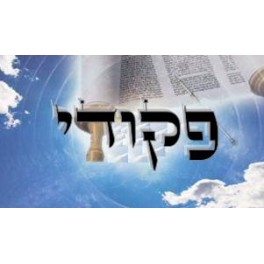דבר תורה פרשת פקודי
Dvar Torah from Aish.com

Moses asked the Jewish people to donate gold, silver and copper for the construction of the
Tabernacle. Seemingly, the most valuable and precious of these metals was gold, second was silver, and most plentiful and least valuable was copper. But each of these three metals were used for completely different purposes in the construction of the Tabernacle.
"Gold... was used... for... the holy work... silver to cast the sockets of the Sanctuary... the copper... the sockets of the courtyard..." (Exodus, 38:24-31)
Gold, silver, and copper all served different purposes in the construction of the Tabernacle. In fact each metal was actually dependent upon the other metals in order for their own purpose to be realized. For example, the gold was used to construct the ark that housed the Torah, but the ark needed to have a courtyard around it in order to protect itself -- which needed the silver and copper in order for it to be made.
Each and every one of us, on some level, all want to change the world. But sometimes we feel that compared to others our contributions are not as significant. But the exact opposite is true. This is because for in order for someone else to help, they almost always depend upon other people doing their part. We all must contribute in the way that God enabled and empowered us to do so. If we don't, it literally prevents others from doing their part.
Sometimes we doubt if we really have what it takes to make a difference, and we further question this if we compare our talent and resources to other people we see making a difference. But this is only half the story.
Every project or cause that was ever completed had many people who made it happen other than those who were "front and center" upon it's completion. It might be the one's who envisioned the project, those who labored in it's every detail, or maybe it was the one who rescued the project after the initial excitement faded. The bottom line is that all of these people are why the project succeeded. But again, they were all individually dependent upon someone else to do their part or there literally would be no place for their contribution.
Think about it. Who could a philanthropist give his or her money to if no one came up with new and exciting ideas?
Don't make the mistake of thinking that your contribution isn't going to make a difference. Just like in the days of the tabernacle you have the responsibility to contribute in relation to your ability. Whether God gave you gold, silver, or copper you're obligated to give what you can. And remember, the one who donates gold can only do so if the one who has copper gives as well. So, no matter what metal you have to give- - whether it's your money, time, or assistance -- take much happiness in knowing that not only are you giving in the exact measure God wants you to but you also lay the foundation for allowing so many others to give as well.





